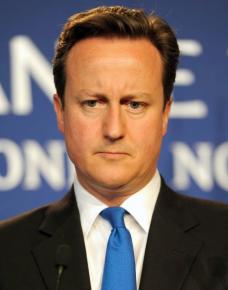An anti-union blast from the past
Belfast Telegraph columnist explains why the latest right-wing assault on workers' rights in Britain has an historical precedent.
DAVID CAMERON was probably puzzled by Trades Union Congress (TUC) General Secretary Frances O'Grady likening him to James Frampton. Squire Frampton has rung relatively few bells in recent years. But across a certain swathe of the population that may now to be changing. There was a higher than ever attendance at the annual Tolpuddle Martyrs commemoration in the Dorsetshire village in mid-July.
The Tollpuddle Six were local laborers who, in 1832, set up the Friendly Society of Agricultural Labourers to fight to maintain existing pay rates and to win better working conditions. Life in rural England was harsh at the time and getting worse. The mechanization of farming had led to lay-offs and a lowering of wages--from 10 shillings to seven and continuing to slide.
Eight years earlier the Combination Acts had been repealed. It was now legal to form trades unions. As well, 1832 was the year of the Great Reform Act, extending the franchise to a larger minority of men.
In spite of the modesty of the measure by modern standards, it represented real progress and encouraged a mood of expectation of deeper change.

A Methodist preacher, George Loveless, called a meeting in the kitchen of his brother-in-law Tom Standfield's home. The Friendly Society was founded and set about recruiting.
Leading local landowner Squire Frampton was unimpressed. He wrote to Prime Minister Lord Melbourne emphasizing the danger to society of trades union agitation and the irresponsibility of demands for the protection of pay at a time of austerity.
He invoked the Unlawful Oaths Act of 1797, prohibiting people from issuing oaths to one another. The Friendly Society had made no secret of the fact that members took an oath of loyalty to one another as part of the admissions process.
The six prime movers were convicted and sentenced to transportation to Australia. A mighty campaign won their release after three years. A plaque at the Mayflower Steps in Plymouth marks the spot where they first set foot back on English soil.
THE ANNUAL commemoration dates back to the 1850s. Lately, it seemed to have lost its allure. But in the last decade, business has been booming again.
All 10,000-plus tickets for this year's event sold out a week in advance, which has never happened before. It helps that there's more to see and hear than bright banners and ringing speeches. Music, poetry and theatre have been added to the mix.
A Methodist service in acknowledgement of the role of Loveless unfailingly attracts a congregation more red than religious.
So, there was a substantial crowd on Saturday to hear O'Grady lash out at Cameron's plans to curtail what unions can lawfully do to defend their members' interests. The proposed new Trades Union Act, she declared, was "a modern-day masterclass in punishing working people and their unions for standing up for their rights." In her view David Cameron and Squire Frampton were brothers under the skin.
She didn't suggest a re-enactment of the Tolpuddle events through unions breaking the law. The TUC's biggest affiliate, Unite, had done this for her the previous week.
A Unite conference changed the rulebook to remove a requirement that the union operate at all times within the law. General secretary Len McCluskey told delegates in Brighton that it was proper, if necessary, to break laws as bad as this.
Under the proposed law ballots for strike action would have to reach a 50 percent turnout; public service action would require 40% backing from all entitled to vote; the police would have to have 14 days' notice of use of any banners, or loudspeakers, or setting up of a Facebook, or Twitter, account; police would also need advance notice of anything to be said via these media; companies could use agency workers as strike-breakers and much else besides.
Apply some of these requirements to Westminster elections and a large majority of MPs would be deemed improperly elected.
The new laws wouldn't apply automatically to the north. Minister Stephen Farry has said that be won't import them. It's worth noting, though, that the union laws associated with Mrs Thatcher have been the "property" of the Assembly since devolution and none of the parties has made any move to ditch them - including parties now shouting their opposition to "Thatcher's anti-union laws" from any rooftop they can clamber onto.
Loveless is one of the most fascinating characters in British labor history. In chains as he waited to be boarded onto the prison ship, he wrote a poem for the Friendly Society, which many might consider as apt today as ever.
"God is our guide! From field, from wave/From plough, from anvil and from loom/We come, our country's rights to save/And speak a tyrant faction's doom/We raise the watchword--Liberty/We will! We will! We will be free!"
They don't write them like that anymore. But maybe they will again.
First published in the Belfast Telegraph.


